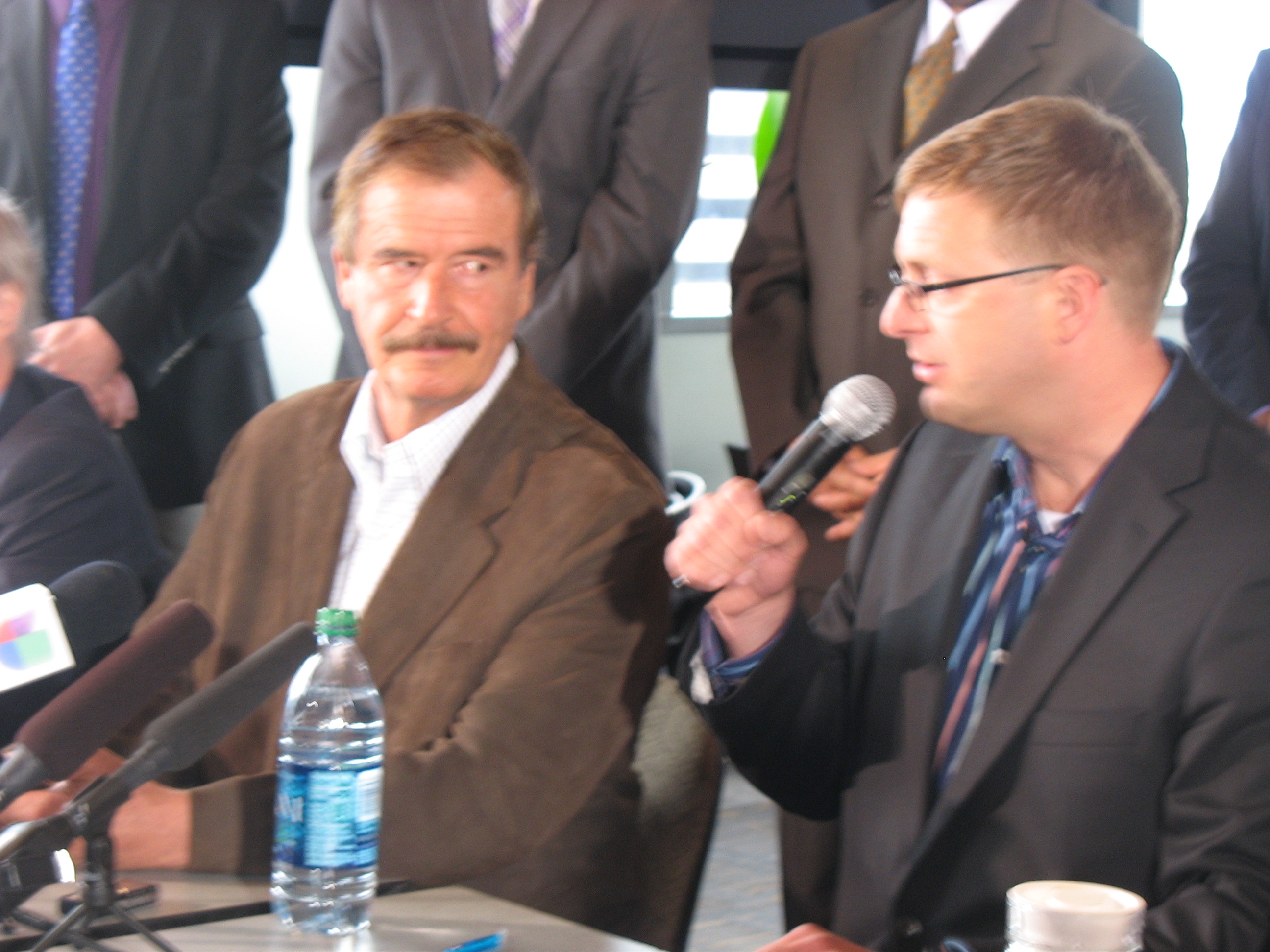“This is a unique moment in history,” Jamen Shively told a conference room packed with journalists on the 40th floor of the Columbia Center this afternoon. You can say that again. First, there was the presence of Shively, a former Microsoft manager who is suddenly the biggest local player in what he likes to refer to as the “dot bong era.” Shively has founded a company, Diego Pellicer, that he confirmed today is currently trying to raise $10 million from investors in order acquire and run a chain of marijuana retail stores in Washington and Colorado—and eventually all over the world.
Second, brought to town by Shively, and sitting next to him today, was none other than former Mexican President Vicente Fox. As Shively related, the two became friends when the entrepreneur worked in Mexico running a company that ran cybercafes and computer centers. Shively, perpetually smiling, emphasized the friendship by periodically putting his arm around the former president’s back.
Press coverage leading up the event seemed to suggest that Fox’s presence would have something to do with a trade arrangement between Shively’s company and Mexico. But no, said the moustachioed dignitary. When it comes to marijuana legalization, he said, “Mexico’s a little bit behind,” making any attempt at trade “difficult” at this point. Instead, he said, noting that he runs a think tank in Mexico, he was here to act as a “witness” to developments here, ones that he hoped would start “a serious debate” in his home country, where he said the cost of the war on drugs had become “unbearable.”
A crowd of journalists, a former president, talk of a multi-million dollar business, it’s mind-boggling how far we’ve come in such a short time. Just three years ago, one of the biggest pot entrepreneurs in town was Steve Sarich, the colorful dispensary owner who ran his operation out of a Kirkland ranch house. He got a ton of press attention not by flying in powerful friends but by engaging in a shoot-out with would be thieves, an incident that sparked an investigation of Sarich’s pot operation by the King County Sheriff’s Office. (No charges were ever filed.)
Of course, the passage of marijuana legalization Initiative 502 has changed everything, setting the stage for more conventional entrepreneurs like Shively. And there’s no question that he’s got big business plans. He said he plans to hire 1,000 people for his Seattle headquarters in the near future and estimates that his employees will number in the “tens of thousands” eventually. His “national brand,” as he calls it, will serve “tens of millions of customers,” he said.
Shively pitches his future product as “premium” cannabis. “Think of it like fine brandy, like fine cognac,” he told Fox Business News in an April interview.
Yet, unlike big players in the liquor industry, or most any other industry really, Shively has a business that is also a cause. And so, his marketing is buoyed by an array of activists still earnestly promoting the importance of marijuana legalization and the need for the federal government to “back off,” as state Rep. Roger Goodman put it at the press conference. Goodman, a longtime legalization advocate came up from Olympia to join a panel of people voicing support for Shively’s plans. Other notable speakers included prominent veteran activist Skip Dreps, who spoke of cannabis’ benefits in treatment of PTSD and traumatic brain injury.
Yet whether the federal government will back off is very much in doubt. And Shively had few answers when he was questioned about how he intended to avoid being nailed for engaging in what might well look to the feds like an interstate conspiracy. “It’s a conspiracy to obey the law,” Shively said. He went on, “we’re making making strategic investments, but making them in such a way as to not violate federal or state law.”
But how, journalists asked him. He said that the details of such investments were proprietary. The only detail he shared was that he does not plan to transport marijuana across state lines.
Similarly, he dodged questions about the “risk mitigation” strategy that he said he had in place for investors. That too was confidential, he said.
Douglas Hiatt, for one, is skeptical. A lawyer who has long defended medical marijuana patients, he says he believes Shively and his partners are “painting a pretty big bullseye” on themselves.








